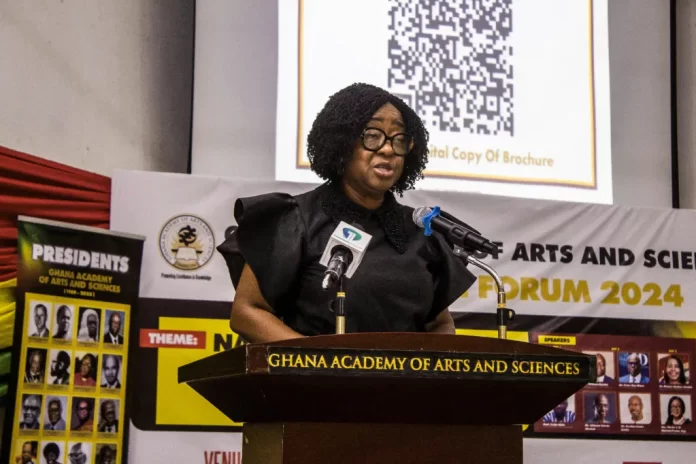Dr Maame Adwoa Gyekye-Jandoh, a Senior Lecturer at the Department of Political Science, University of Ghana, has called for a quota system to be established to promote women participation in politics.
The quota system, she said, should include the reservation of a percentage of parliamentary seats for women to serve as a motivation to them and promote women inclusion.
Dr Gyekye-Jandoh made the call at the 2024 public forum of the Ghana Academy of Arts and Sciences, in Accra, on the theme: “National Elections in Ghana: Issues and Prospects”.
Dr Gyekye-Jandoh, who was speaking on the topic: “Women Representation in National Elections: How Far Have We Gone and What More Needs to be Done,” noted that Ghana had, over the years, made significant strides in achieving inclusivity at all levels.
Currently, Ghana has 40 Members of Parliament (MP) who are women, representing 14.5 percent of the 275 MPs of the August house.
Dr Gyekye-Jandoh said the figure, although an improvement from previous years, still fell short of the 30 percent women representation target set by the Beijing Declaration almost three decades (in 1995) ago.
Additionally, she noted that the situation, if immediately not addressed, would prevent Ghana from achieving the Sustainable Development Goal (SDG Five – Achieve Gender Equality and Empower all Women and girls) by 2030.
“In fact, if you take the District Assembly, it is even worse. Only 4.1 percent of women were voted to the District Assemblies last year, the 2023 district elections,” she indicated.
The political science lecturer, among other things, called for an immediate passage of a legislation, especially the passage of the Affirmative Action Bill into law, to address the shortfall.
She said the bill, which has been in Parliament for years, when passed into law, would be a great step towards achieving inclusivity in all aspects of the society particularly in politics.
“I think we need to have that legislative quotas, we need to have the constitutional quotas.
We need to get the women there in the first place. When they run primaries and win the primaries and become candidates, they will win,” she said.
Dr Gyekye-Jandoh added that “one of my recommendations is the reserved seats to start with.
Rwanda has done that, it helped them, we have Sierra Leone recently passed that law (in 2023) and they’ve gone up.
So, let’s get the women there, let us start with some reserved seats mandated by the constitution, constitutional quotas.
These are the most aggressive forms of affirmative action.”
“Look at Ghana since 1951, I mean, we haven’t gone far at all and so we need now to be aggressive and get the women in there.
And I’m happy Sierra Leone has done it, Rwanda has done it, Kenya has done it, South Africa has done it, others are doing it.
Ghana can do it and we must do it and now is the time.”
Mrs Sheila Minkah-Premo, a Senior Law Partner at the Apex Law Consult, speaking at the same event, called on civil society to intensify their capacity building and ongoing support to women candidates to enable them to compete.
Speaking on the topic: “Civil Society and Women Inclusiveness in National Elections: A Comparative Perspectives and Lessons,” Mrs Minkah-Premo also proposed the creation of a National Civil Society Platform to give a broader voice to women and help attain the inclusivity agenda.
The Platform, she said, should include all women’s right organisations, non-governmental organisations, the academia and religious groups.
Mrs Minkah-Premo also urged political parties to grant financial support to women who availed themselves for political positions to serve as a motivation for others.





